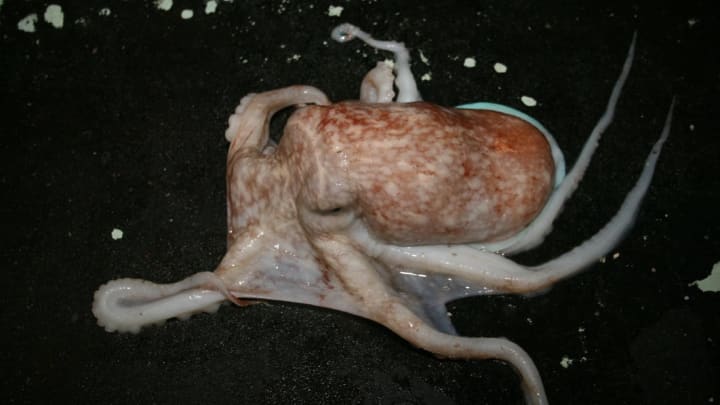The tiny town of New Quay in Ceredigion, Wales, is a picturesque seaside resort during the summer. But in recent days, it has seemingly turned into the set of a horror movie, thanks to an eerie natural phenomenon that has puzzled locals and scientists alike. Dozens of curled octopuses—a cephalopod species that's common in the northeast Atlantic, including around the British Isles—have squirmed their way out of the ocean and onto the sand. They've been routinely spotted scuttling along the coast at night, according to The Guardian.
Between 20 and 30 of the nocturnal creatures were seen making evening strolls for three nights in a row. Later, several dead octopuses were discovered washed up on shore. "It was a bit like an end-of-days scenario," a local man named Brett Jones joked to BBC News.
Jones—the owner of SeaMôr Dolphin Watching Boat Trips, a wildlife tourism company—rescued some of the beached octopuses and returned them to the water. He was puzzled by the incidents, telling the Telegraph that curled octopuses typically like to hide beneath rocks in deeper water. He also noted that the octopuses didn't seem to exhibit any signs of injury or harm, according to National Geographic. (Jones did, however, warn people to wear gloves if attempting their own catch-and-release, as curled octopuses "bite like mad.")
Octopuses mainly live in the ocean, although they do occasionally slime onto dry land to hunt prey. So what are they doing roaming New Quay's beaches? Theories range from overcrowding due to skyrocketing populations (which would force the creatures to find new habitats and food sources) to senescence, which is an end-of-life stage that causes octopuses to become disoriented and clumsy, to environmental changes. Some also speculate that storms like Hurricane Ophelia and Storm Brian might be responsible for the creatures' strange behavior.
The mystery hasn't been solved quite yet—but in the meantime, you can watch video of one of New Quay's beached octopuses below, or even lend Jones's rescue efforts a helping hand if you're in the area. (Just remember to bring gloves.)
[h/t The Guardian]
